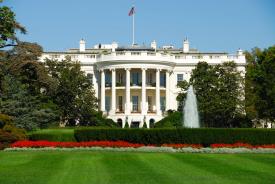
|

Share via Email
| * Email To: |
(Separate multiple addresses with a semicolon)
At least 1 email to send TO is required.
|
| * Your Name: |
Your name is required.
|
| * Email From: |
(Your IP Address is
18.221.85.33)
Your Email Address is required.
Your email is not correctly formatted
|
| * Email Subject: |
(personalize your subject)
|
|
|
Email Content:
|

Agriculture and the New Administration; Predictions and Possibilities
|
11/17/2020 |
|
 With the now inevitable inauguration of President-elect Biden on January 20th, 2021 it is appropriate that we should consider the approach of the incoming Administration with respect to trade issues, agriculture and related environmental considerations. “Prediction is a difficult exercise especially as it involves the future” is an oft-repeated adage. It is, however, worthwhile to play the informed guessing game if only as an intellectual exercise, but possibly to adapt to future policies. With the now inevitable inauguration of President-elect Biden on January 20th, 2021 it is appropriate that we should consider the approach of the incoming Administration with respect to trade issues, agriculture and related environmental considerations. “Prediction is a difficult exercise especially as it involves the future” is an oft-repeated adage. It is, however, worthwhile to play the informed guessing game if only as an intellectual exercise, but possibly to adapt to future policies.
According to the Biden-Harris transition website <buildbackbetter.com> a series of agency review teams have been established to facilitate a smooth transfer of power. The website states that "these teams are most highly experienced and talented professionals with deep backgrounds in crucial policy areas across the Federal government".
|
|
Members of transition teams are governed by the provisions of the Presidential Transaction Act. This law requires disclosure of both the source of funding and most recent employment of participants. Members of teams can be either volunteers, full-time transition employees receiving payment from the funds provided by the elected candidate or through an appropriation administered by the General Service Administration. For the 2021 transition, the GSA has yet to assign funds based on directions from the White House.
|

USDA Building DC. |
In reviewing the composition of the transition teams for relevant areas including the Council of Economic Advisors, Council on Environment Quality, Department of Commerce, Department of Health and Human Services, Department of Labor, the Environmental Protection Agency, International Development, Office of the U.S. Trade Representative and the USDA, a number of trends are evident. The review teams are balanced with respect to current affiliation including thank tanks, past senior-level administrators in federal and state government, professionals in consultancy, media, law and academia but few from industry. The Biden-Harris website claims that the teams were "crafted to ensure that they reflect the values and priorities of the incoming administration". It is obvious that there is considerable demographic diversity, but with few household names given that the review teams have been chosen for professional experience and creditability in their respective fields.
|
|
- The USDA team comprises seventeen members with five from academia, one member from a union and four current or retired state or federal agricultural administrators. All are classified as volunteers. The team is led by Dr. Robert Bonnie of the Duke University Bi-partisan Policy Center.
- The team reviewing the office of the United States Trade Representative is led by Jason Miller and comprises fifteen members, again representing a wide array of affiliations including academia and think-tanks including the Council on Foreign Relations, the Center for American Progress and the Urban Institute.
- The Environmental Protection Agency Team is led by Patrice Simms of Earth Justice, an advocacy group and includes eleven other members drawn from academia and law firms with one representative from the Sierra Club.
- The team reviewing the Department of Health and Human Services with an indirect involvement with agriculture and food production is led by Chiquita Brooks-LaSure of a Washington law firm. Members are drawn from academia, advocacy groups including the Center for Budget and Policy Priorities, the Pew Charitable Trust and state departments of health and human services.
The intended policies of the incoming Administration with respect to agriculture are difficult to predict by simply reviewing the names of those appointed to review teams. Probable policies with regard to agriculture and food were not emphasized during the election campaign that was dominated by considerations including COVID, economic recovery and differences in style between the two candidates. The following broad assumptions can be drawn from pre-election rhetoric.
- Many of the Presidential executive orders relating to labor, immigration, environmental and climatic issues will be rescinded.
- Support for ethanol production is a bipartisan issue and has become a third-rail in government. The biofuels program will continue to be supported despite opposition from the livestock industry and consumers. The RFS supports corn growers and the ethanol industry and represents an indirect tax on all who eat or drive.
- Regulations issued in terms of the GIPSA released on the last day of the Obama administration in January 2017 will in all probability be resuscitated in some form favoring contract growers.
- The confrontational trade policy especially with regard to China will be softened benefiting exports.
- The U.S. may join the Comprehensive and Progressive Agreement for Trans-Pacific Trade with advantages for U.S. exporters.
- The U.S. will rejoin the WHO and will become active in the WTO restoring cooperation with other international agencies.
- Since control and suppression of COVID is critical to restoration of our economy it is hoped that the incoming administration will build on the availability of vaccines developed through Operation Warp Speed, initiated by the outgoing administration in early 2020. Implementing necessary improvements in disease reporting, restoring the image and creditability of the FDA and the CDC. will be critical to controlling COVID. Reducing the incidence rate of COVID will have a beneficial effect on the economy and directly improve the financial position of U.S. agriculture and allied industries.
- During 2020, farmers earned as much as 40 percent of their income from federal programs including CFAP payments and compensation from disruption in trade with China. A more balanced trade policy should obviate the need to support agriculture with public funds.
It will be a few weeks before the Biden-Harris team nominates Secretaries for departments relevant to agriculture. It is hoped that the transition teams will develop candidate lists reflecting experience, bipartisanship, depth of knowledge and ability to select and motivate subordinates. Above all it is hoped that the process will proceed rapidly without the interminable delays noted following the 2017 inauguration. Secretary Sonny Perdue was the last nomination to be announced in the current Administration and many of the critical deputy positions remained unfilled almost to the midterm election. It is hoped that there will not be any political obstruction of qualified nominees by the Senate and that confirmation will be rapid and non-partisan.
|

|
|
|

|
| |
Copyright © 2024 Simon M. Shane
|
|
|